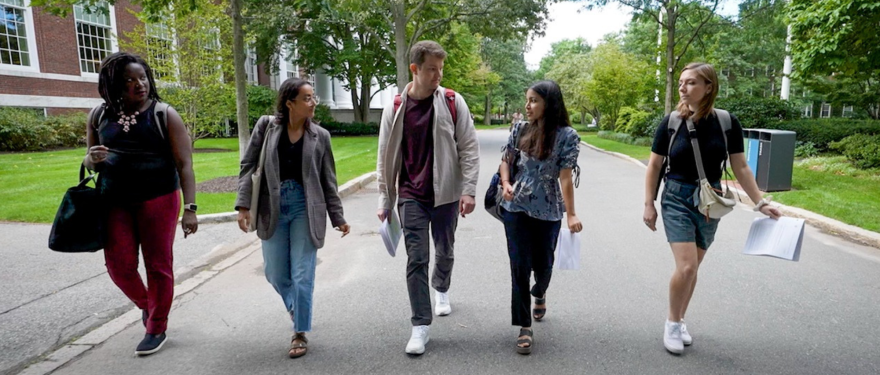MBA Class of 2024 students Landon Hollingsworth (MBA/MPA-ID 2024) and Teresa Danso-Danquah (MBA 2024) discuss forming and leading the Disability Advocacy and Affinity Group (DAAG), the challenges and strengths of their own disabilities, and how businesses can create access and awareness for their employees.
Transcript:
[MUSIC PLAYING]
Teresa Danso-Danquah (MBA 2024): There's a legal definition of disability. A physical or mental impairment that substantially impacts a major life activity, and that's defined by the Americans with Disabilities Act. But disability for me is just any other part of diversity and part of the human experience.
Landon Hollingsworth (MBA/MPA-ID 2024): And it is a facet of a person's identity. It's not a condition. It's not something to be solved. It's something to be celebrated.
Teresa Danso-Danquah: If 1 in 4 people right now have a disability, that is someone you know, someone you could be working right next to you.
Landon Hollingsworth: I have dyslexia and ADHD. For me, it's always been very difficult to read large amounts of text, and it takes a little bit longer for me to process written information.
Teresa Danso-Danquah: I was an advocate for my sister, who has an intellectual disability, and it wasn't until college that I was diagnosed with mental illnesses. Since then, other physical disabilities. Prior to school, I actually deferred to focus on my health. I also had a major surgery. Sometimes I'm able to walk well, sometimes I'm able to sit for long periods of time, and sometimes I'm not able to.
Landon Hollingsworth: Including allies, we have about 50 people. We're hoping to grow that number significantly this year because we know that there are far more than 50 people who have a disability here at HBS.
Teresa Danso-Danquah: I always thought I could just push through. And I think we live in a society that rewards that. And I realized it's OK to say that I'm not OK. To reach out for help and to ask for that. There's so many people that struggle with authenticity and vulnerability, and I know that I have found probably my greatest strength and power in being able to be authentic and vulnerable.
Landon Hollingsworth: Part of the reason that we created this group was to give people a space who maybe have a disability, but don't feel comfortable talking about it, don't feel comfortable identifying that way, can give them a space to feel comfort and to feel like they have other people around them that support them and can celebrate them.
When it comes to businesses, I think that there's three things that they should be doing. One is just acknowledging that folks with disabilities are assets. The second thing, I think, is removing barriers. That could be physical barriers, it could also be of non-physical barriers. The third thing is just to create access.
Teresa Danso-Danquah: I want people to recognize that people can be leaders with disabilities, and they can be in high-powered jobs and fast-paced jobs, and still thrive with a disability. And that's something that I bring to the roles that I've had on campus, whether it's being President of PRIDE or being part of the DAAG.
Landon Hollingsworth: The experience here, founding this group, really opened my eyes to what it means to build something from the ground up. You can be extremely passionate about something and you can be extremely adept at running a business, but no ship sails itself alone.
Teresa Danso-Danquah: I wish we could live in a world that really embraces universal design, which is the idea that when we make something, we think of the broadest range of people that could use that product, whether it's a curb cut that actually helps someone in a wheelchair, but also a woman pushing a stroller or someone using an accessible door to be able to open the door while they're carrying a lot of books, not just someone with a disability.
Landon Hollingsworth: I came to Harvard because I wanted to understand how can we use business principles in the non-profit sector and the social sector to drive more change? Because when an organization runs more efficiently, any organization, but especially non-profits, they're able to drive more impact.
Teresa Danso-Danquah: Healing is a lifelong journey. So I am grateful for my time here, for even like the challenges that I've had, and I look forward to being a stronger advocate when I graduate.
[MUSIC PLAYING]
This video was originally published on the HBS Newsroom page.

